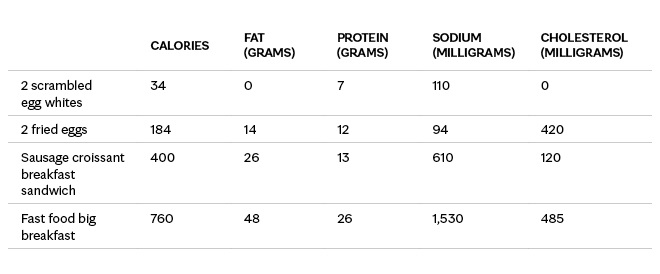Every few years, questions arise about eggs. Are they good or bad for you? What about their protein and cholesterol content? How often can you eat them?
Let’s crack open the facts about these meals in a shell, starting with the nutritional breakdown.
One egg contains:
- 75 calories
- 5 grams of fat
- 6 grams of protein
- 0 carbohydrates
- 67 milligrams of potassium
- 70 milligrams of sodium
- 210 milligrams of cholesterol
Eggs are also a great source of vitamins A, D and B12, as well as choline, a nutrient essential in many metabolic steps.
A closer look at cholesterol in eggs
Research shows that the cholesterol in eggs doesn’t seem to negatively affect the human body compared with other sources of cholesterol.
For example, people typically eat eggs with other foods high in salt, saturated fat and cholesterol such as bacon, cheese and butter. These foods are known to increase heart disease risk and you should eat them sparingly.
An egg on its own is a nutritious option for breakfast, lunch or dinner. Most healthy people can eat up to seven eggs a week without affecting their heart health. Some choose to eat only the egg white and not the yolk, which provides some protein without the cholesterol.
Here’s how eggs stack up nutritionally in dishes that feature eggs:

Eggs can be a good addition to a healthy, well-balanced diet.
Just remember when making an egg dish like an omelet, egg bake, bowl or toast, to watch out for those high-calorie, high-fat extras like cheese, bacon and butter.











Leave a comment